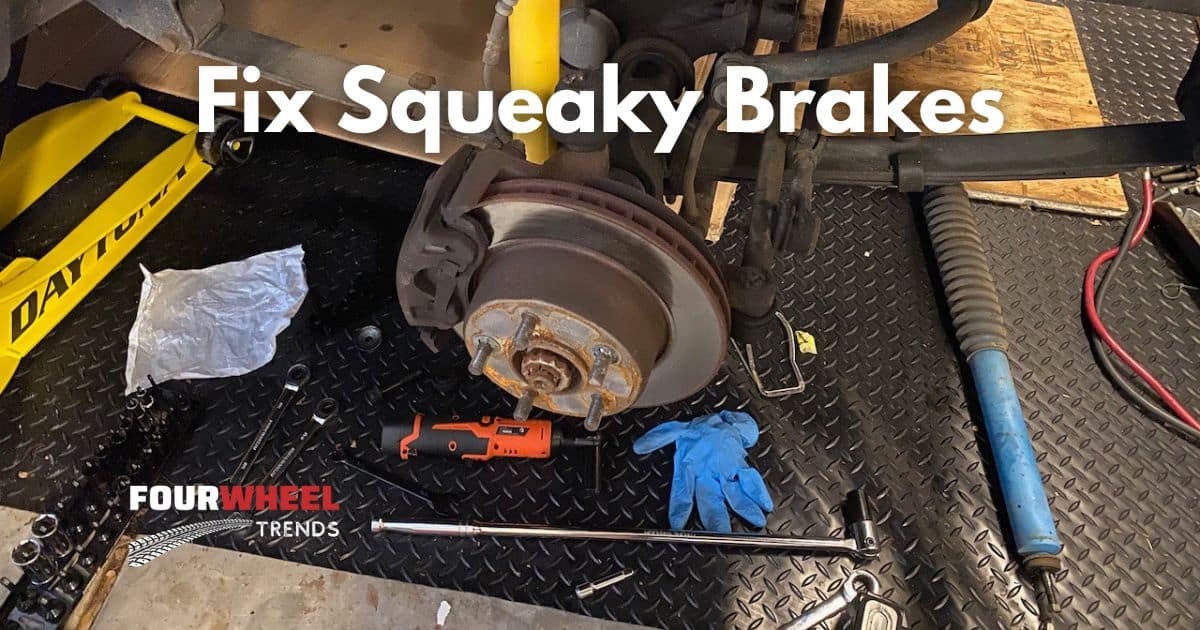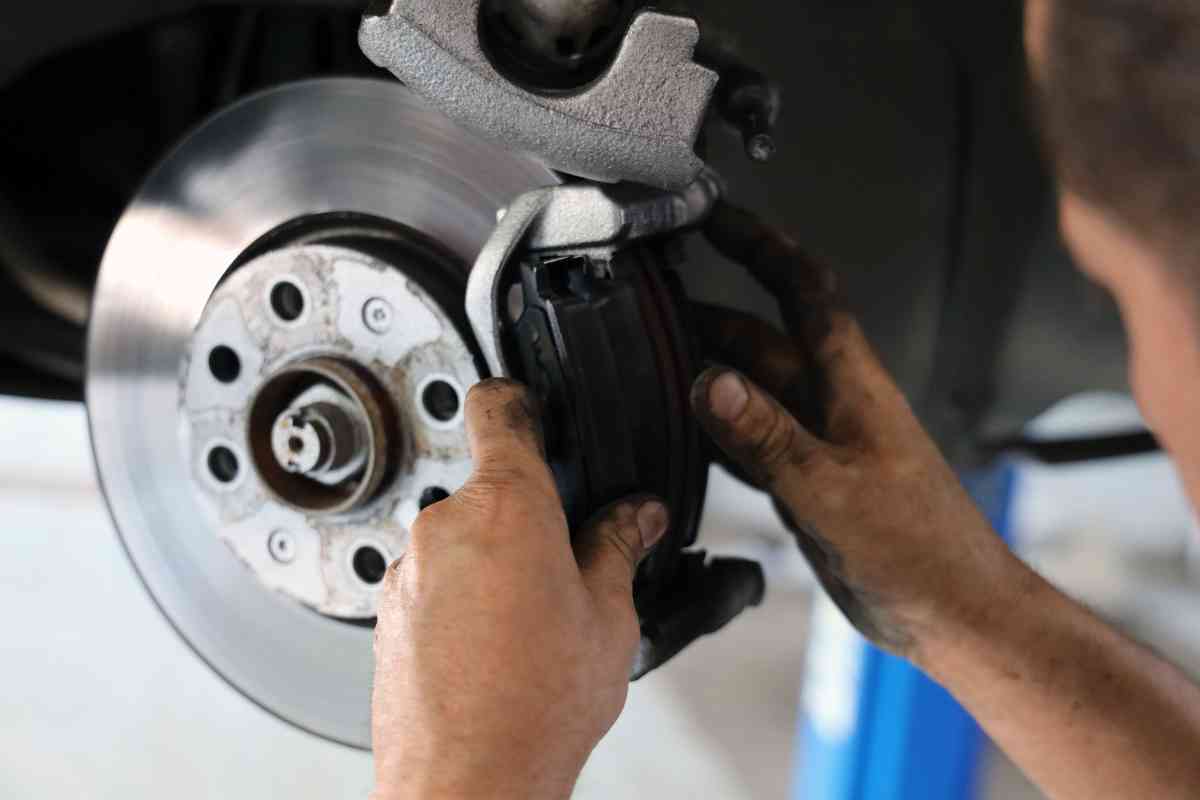How to Fix Squeaky Brakes (Without Losing Your Mind or Your Marriage)
A few weeks ago, my wife hit me with the dreaded, “Hey babe, can you come listen to this sound my Yukon is making?” If you’re married and into cars, you know this moment well. It’s the unofficial start of an afternoon project you didn’t plan on, probably involving dirt under your nails and at least one skinned knuckle.

Her 2019 GMC Yukon was making a high-pitched noise while driving, but only stopped when she pressed the brakes. That’s when my inner mechanic clicked on. I’ve been around cars long enough to recognize the classic cry for help from worn brake pads.
So I swapped them out—new pads in, rotors looked fine, no weird caliper behavior. Problem solved. Or so I thought.
Two months later, she hit me with: “It’s doing it again, but this time it only squeaks when I lightly press the brake.” Cue the head-scratch and the Google spiral we all know too well.
Turns out, squeaky brakes aren’t always a sign of disaster. Sometimes, they’re just annoying, like that one neighbor who revs their Harley at 6 AM.
Let me walk you through how I fixed the issue and managed to save our ears (and marriage).
What Causes Squeaky Brakes?
Let’s start with the basics. Brakes can squeak for a few different reasons:
- Worn-out brake pads – The metal wear indicator is designed to squeal and tell you it’s time for a replacement.
- Dust or debris – Little rocks or grime can sneak in and make noise.
- Moisture or rust – A little surface rust can cause a squeal until it wears off.
- Glazed pads or rotors – This is when the surface of the pads or rotors gets too smooth and polished from heat or improper bedding.
In my case, the initial squeak was clearly the wear indicator. Classic. But the second issue was sneakier. The pads were still new, but squealed when lightly braking at low speeds. That’s often due to glazing or uneven pad deposits.

Step-by-Step: How I Fixed the Squeaky Brakes
1. Double-check the install
I popped the wheels off and checked everything. Pads were seated correctly. No signs of uneven wear. Calipers were tight. Always start here—sometimes a small misalignment can cause bigger issues.
2. Look for glazing
I checked the rotors. They had a slight mirror-like finish, which told me the pads might’ve glazed over from gentle braking during city driving. My wife drives like a responsible adult (good for safety, bad for bedding-in new pads).
3. Fix it with a brake bed-in
Here’s the part where it gets fun—and slightly dramatic.
I took her Yukon out to an empty side street, got it up to about 35 mph, and slammed the brakes hard enough to make the ABS kick in. I repeated this 4 or 5 times, letting the brakes cool slightly between runs.
It’s not something you want to do in a crowded parking lot (unless you’re trying to make a scene), but it’s a proven way to heat up the pads and rotors, burn off any glazing, and properly bed the surfaces together.
After that? No more squeaks.
Pro Tips to Keep Brakes Quiet
- Use quality brake pads – Cheap pads are like cheap coffee: they seem like a good idea until they start screaming.
- Install anti-squeal shims – Most new pads come with them, but make sure they’re in place.
- Apply brake grease – A little grease on the back of the pad (not the friction side!) can dampen vibration.
- Don’t baby your brakes – After installing new pads, do a proper bed-in. A few hard stops from 30-40 mph to nearly zero, without fully stopping, will help transfer an even layer of pad material onto the rotors.
Final Thoughts
If you’ve ever diagnosed a squeaky brake while your spouse leans over your shoulder with a skeptical look, you know it’s not just about the noise—it’s about keeping things running smoothly on all fronts.
Squeaky brakes can be a minor annoyance or a sign of something bigger. Start with a basic inspection, check for wear, and don’t underestimate the power of a proper bed-in.
And if all else fails? Tell your significant other it’s time for them to drive your car until you get it sorted. That usually lights a fire under your weekend schedule.
Stay safe, drive hard, and keep those brakes quiet.
Frequently Asked Questions: Simple Fixes and Tips for a Quieter Ride
Squeaky brakes can be annoying. There are ways to reduce or fix squeaks using the right tools and methods, and understanding why brakes make noise is important for safety and comfort.
Can I stop my car brakes from squealing without having to remove the wheel?
It’s tricky to stop squeaking without taking off the wheel on a car. Most solutions, like applying lubricant to the back of the pads or checking for stuck debris, need you to access the brakes directly.
However, you can use a brake cleaner spray from outside, which might help if the squeal is from surface dust, but this fix is less effective for ongoing issues.
Why are my newly installed brakes still making a squeaking noise?
New brakes often squeak at first because the pads need time to “bed in.” This is a normal break-in process.
If the squeak doesn’t go away after a week or so, it could be from dust, lack of lubricant at contact points, or the pads not being installed straight. It might also be the wrong type of pad for your vehicle.
What should I do if my brake pads are fine but there’s still a squeaking sound?
Check for dust, dirt, or rust on the rotors. Even if the pads are fine, buildup on other parts can cause a squeak.
Lubricate the metal points where the pads touch the caliper. If the sound continues, inspect for worn shims or small stones stuck near the brakes. This kind of inspection is useful for both bikes and cars.
How should I properly use brake squeal spray to quiet down my brakes?
Always follow the instructions on the can. Spray a light coat onto the back of the brake pads or on the metal contact points, never on the pad’s braking surface.
Let the spray dry before putting everything back together. Spraying directly onto the rotor or pad face can cause loss of braking power.
When is it necessary to use brake lubricant to fix squeaky brakes?
Apply brake lubricant to the back of the brake pads, caliper pins, and sliders if they are dry—never on the area where the pad meets the rotor.
It’s especially helpful if squeaks are caused by dry contact points or friction between metal parts. Using lubricant correctly can help quiet brakes and make them last longer.
